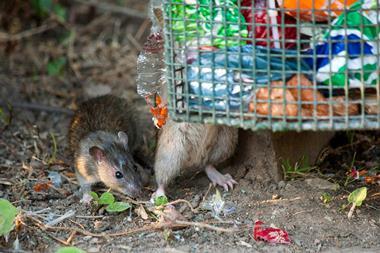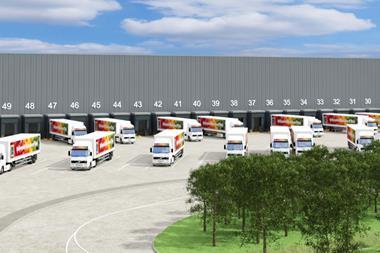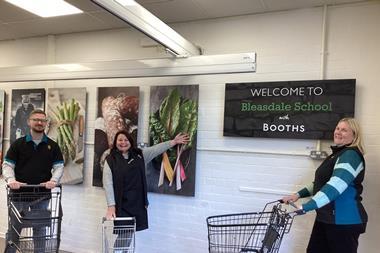The UK’s cost of living crisis is pushing more and more Brits into food insecurity. Social supermarkets and other surplus food redistributors have sprung up to get good food into the hands of those in need
The “year of the squeeze” is here. With inflation at a 30-year high and prices still mounting, 2022 looks set to be marked by thousands of people having to make the near-impossible decision to spend money on heating or eating. And as the Food Foundation says, when disposable income is tight “food is often the first place where costs can be cut”.
Yet thanks to a nascent category of retailers, many Brits may be saved from this choice. ‘Social supermarkets’ – also known as surplus or redistribution stores – are filling the gap between supermarkets and food banks, helping those unable to afford full-priced food yet with enough to fall outside the criteria for food banks.
Social supermarkets take several forms. In some cases they look much like a regular retailer, open to the public who can purchase surplus food at heavily discounted rates. Others run a membership model for those on low incomes and key workers like NHS staff in which a membership fee is paid, enabling customers to visit and take what they need. A third kind of store packages up parcels of food, which are made available at weekly pop-up stores for a set fee.
Just like food banks, they rely on surplus food from the rest of the industry, be it an upcoming use-by or best-before date, incorrect labels, or damaged packaging. They differentiate themselves, however, by offering more choice and taking a form of payment from shoppers – a crucial point of difference for many.
“Social supermarkets allow customers to pay some money, so even if it’s symbolic, it’s then not a handout,” explains Lopa Saxena, a research fellow at Coventry University and co-author of The Emergence of Social Supermarkets in Britain: Food Poverty, Food Waste and Austerity Retail. “There’s a degree of choice and an element of dignity. It’s a step up from food banks and wraparound support for the people to help them move out from food insecurity.”
Food banks serve the immediate crisis where “you need whatever someone can give you” says Emma Wilkes, founder and MD of Neo Community, a café, store and community hub charity in Tranmere.
“A social supermarket is a step along from that. People struggle and it helps their money go further. Even if it’s only a pound. Handing it over means you’re giving something for something. That’s important. It makes such a difference to people and builds their confidence,” Wilkes says.
The number of people struggling to afford decent food yet a cut above the requisite dire straits to prompt a food bank referral is rising in the UK.
In an FSA survey of UK households published last month 15% were classified as food insecure, of which 9% had low food security, meaning reduced quality and variety to their diets; and 6% had very low food security, meaning reduced food intake and disrupted eating patterns (Ipsos MORI). Over a quarter of the 6,271 respondents (from 4,338 households) expressed ‘high concern’ about the affordability of food.
It is a consistent theme in modern day Britain. New data this month from the Food Foundation found food insecurity is rising in UK households, with 3.6% of the population – some one million adults – reporting that they or someone in their household went a whole day without eating in the past month because they couldn’t afford or access food.
Many people are left with few options. “For people who are struggling to get by, people who don’t have any savings behind them or any resources and one thing will knock them over the edge – there is nothing for them,” says Mark Game, CEO of mobile affordable food club The Bread & Butter Thing, and a former MD of redistribution supermarket Company Shop. “They struggle to afford everyday retail, so they don’t have anywhere to go but social supermarkets.”
The Bread & Butter Thing saw a fivefold increase in membership requests at the start of lockdown in April 2020, and has continued to see a steady increase ever since. The charity now has over 23,300 members across the north east and its expansion is now causing difficulties. The organisation is still running on a similar sized budget, leaving it struggling to meet the needs of all those who need it. “It’s really tough and really frustrating because there’s only so much you can do. We’re a sustainable model but we need funding and support to expand our model,” says Game. “There are so many more people coming to us that we’d like to support.”
The Bread & Butter Thing is not alone in its dramatic uptick in interest in recent times. At the Neo Community social supermarket there has been a fourfold increase in the number of shoppers at its store since the start of lockdown; while Company Shop has opened three new stores and two Community Shops in the last 12 months to take its total to 23. Community Shops are the company’s latest social enterprise, adding learning and development programmes alongside its discounted food range.
“In the current climate, everyone’s looking to stretch their budgets,” says Steph McGinty, group MD. “The expansion of Community Shop will allow us to reach even more people on the cusp of food poverty within more of the most deprived communities in the UK,” she adds.
For membership food shop Your Local Pantry, demand has also “risen rapidly” says Niall Cooper, director of Church Action on Poverty, which co-ordinates the Your Local Pantry network. “In the past two years, we’ve grown from 15 Pantries to more than 60, and we expect to reach 200 within the next few years.”
Expansion comes with its own difficulties. Not only do stores often need more funding, but sourcing enough surplus food becomes increasingly difficult, a task made no easier by the policies enforced by supermarkets and suppliers. “When I first started people would look at me like I had two heads when I was asking for their waste,” says Wilkes at Neo Community.
Complete misnomer
While food redistribution has become more common in the years since, many of the same problems remain. Businesses are still often reluctant to share surplus food for fear of reputational damage if someone were to become ill from eating an out-of-date product.
But that’s a “complete misnomer” says Game. “The risk of reputation really does sit heavily on the redistributor – it’s misguided when people think it’s the other way.”
Own label is a particular sticking point. Major supermarkets have long been slow to put up ranges for redistribution to smaller organisations. While Morrisons has done so for some time and was joined more recently by Sainsbury’s, many have a hard policy against the practice.
“The biggest single thing I need today is for all retailers to give us own label approval. I don’t have logistical or operational problems – I have barriers that are beyond my control,” Game says.
More often than not, bigger businesses will solely give surplus to larger redistributors through partnerships with the likes of Neighbourly, FareShare and Company Shop. By partnering with just one major redistributor, supermarkets and suppliers believe they can secure protection from reputational damage while simultaneously avoiding dealing with scores of local charities and groups.
“I wonder if suppliers gifting product realise the fees we have to pay”
In 2020 alone, Company Shop Group handled more than 80 million items and saved 28,073 tonnes of surplus food from going to waste. Brands choose it, says McGinty, “because we ensure brand integrity and the highest standards of food safety”.
FareShare, meanwhile, offers retailers a “traceable, safe and secure way to redistribute own-label edible surplus food” – collecting from their distribution sites and sending to thousands of charities.
These major organisations will sell their goods onto a social supermarket, but nonetheless still often “make it harder” for the smaller organisations to get hold of what they need, says Wilkes.
“I wonder if suppliers gifting it realise the fees that we have to pay. And the waiting list to become a recipient is ridiculous. You could be waiting years,” she says. Nonetheless, with social supermarkets like Neo Community reliant on their food to serve the community, they can find themselves “backed into a corner” without a choice.
The supply chains may be established this way, but the preference of big business to partner with the major redistributors is “a roundabout way” of getting food into the local area, says Saxena at Coventry University.
“It’s a great deal for the retailers and suppliers from a market efficiency point of view. Instead of sending it to landfill and paying for that, an organisation comes and takes care of it,” she says. “But if the food industry was really genuine about improving access to food for local communities, they could do that. They find it easier to partner with, say, FareShare because they just handle everything.”

Food surplus disposal
“Food provision in this context is akin to food surplus disposal,” she adds. “A way of dumping unwanted surplus, rather than being driven by the needs of people”.
As such supermarket donations are typically not based around the nutritional need of those receiving them. Every redistribution organisation The Grocer spoke to is regularly forced to top up stock with items bought elsewhere to ensure their customers are provided with a nutritionally wholesome range of stock.
“Although much of the food that Pantries stock comes via FareShare, which means it can vary depending on national supply chains, Pantries have other local independent suppliers and can also buy food directly to ensure shelves are always well-stocked,” explains Cooper. “Pantries always have a mix of good-quality food, including fresh fruit & vegetables, frozen and chilled food, and long-life tins and packets.”
Despite their difficulties, there remains plenty of surplus food in the supply chain they can get their hands on. Since data was first collected in 2015, the volume of food being redistributed has tripled, according to Wrap.
“Many producers and supermarkets are getting better at cutting waste, but even so we know there’s been significant increases in surplus food being redistributed in recent years,” says McGinty. “We also know there’s more surplus that can be redistributed that is not being touched at the moment, particularly in the harder-to-reach areas higher up the supply chain.”
The cost of living squeeze in numbers
- 62% of households have experienced higher energy bills, which are set to soar still further when the cap removal comes into effect in April, according to a Food Foundation survey.
- The cap will be increasing by 54%, expected to cost the average household an extra £693 per year.
- 5.8 million people in England, Scotland and Wales claim Universal Credit.
- 40% of Universal Credit claimants are workers.
- £20 a week extra was issued to claimants throughout the pandemic but they are now managing on less after the boost was removed in October.
- 77% of manufacturing companies and 74% of retailers and wholesalers (across all sectors) expected price rises in the next three months, a British Chambers of Commerce poll found.
- 4.4% since January 2020 is the average take-home retail price rise across commonly purchased food and drink items, according to CPI data. Prices have increased 3.9% since January 2021.
- Oils and fats saw the largest rise of 15.9%. Fruit is now 6.9% higher; vegetables 4.5% higher; milk, cheese and eggs 5.7% higher; and meat 3.9% higher.
- Overall inflation in the UK rose by 5.5% in the 12 months to January 2022, latest CPI data reveals, up from 5.4% in December 2021. It is the highest 12-month inflation rate seen since 1997.
- £180 is the forecasted increase to annual food bills this year [Kantar].
- 1.25% increase to National Insurance tax, coming in April.
- Wages in real terms were down 0.9% in November, decreasing for the first time in over a year once adjusted for inflation, according to latest ONS data. Earnings are expected to continue to fall throughout 2022.
As she puts it, surplus stock is “an inevitable occurrence within the manufacturing and retail process” and “hard to avoid”.
The sector is certainly working hard to reduce it. The emergence of wonky veg on shelves has made small inroads into the amount of fresh produce thrown away, while in January Morrisons became the first UK supermarket to switch from ‘use by’ to ‘best before’ dates on its own-brand milk, saving seven million pints “being wasted” every year.
Nevertheless, says Game, despite their efforts there will always be surplus food. “There is a huge untapped resource to go around. If anything, with the combination of Brexit and logistics issues, I would say there’s more,” he says.
So what does the future hold for social supermarkets? They’re relied on by many thousands of people, offering a vital support service in times of needs, picking up a hole in support that should arguably never exist at all.
“Social supermarkets mask the problems of over-production and the number of people who need to turn to them”
“My goal at Neo is for the social supermarket to not be needed,” says Wilkes. “Our plan is to just be there for the community and to not be relied upon for food.”
But it seems unlikely any time soon. And Saxena believes social supermarkets are providing a “mask” for bigger underlying issues. “The narrative is that [food redistribution] is a win-win-win. People in need benefit, the environment benefits, and retailers benefit,” she says. “But by increasing the number of social supermarkets, retailers and suppliers might end up doing less to combat the problem of generating too much food waste in the first place.
“It masks the problem of over-production. And it masks the number of people who are turning to social supermarkets for their food needs, instead of asking: why aren’t people able to buy their food from the mainstream supermarkets?
“Ultimately, there has been a slow but steady legitimisation of food surplus redistribution in the UK’s urban foodscape, supported by powerful actors in the private, public and non-profit sectors,” she explains. “It’s a much easier and shallower way they’ve found to deal with the problems of food insecurity than having to look at the underlying systemic failures.”
As the big squeeze tightens its grip, it’s inevitable more and more people will be forced to visit redistribution retailers and organisations. As Wilkes puts it: “I’m proud of the work our volunteers do. But there’s no way in hell I’m proud it’s needed in this country.”




















No comments yet